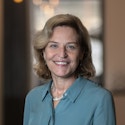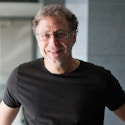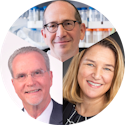On April 3, 2019, David Van Essen provided an overview of basic principles of cortical organization and connectivity from studies of laboratory animals and analyses of individual variability in humans. He also highlighted a new map (‘parcellation’) of the human cerebral cortex based on data from the Human Connectome Project.
His talk was part of the Simons Foundation Life Sciences lecture series.
About the Lecture
The cerebral cortex is the dominant structure of the human brain and is chiefly responsible for what makes us unique as a species and as individuals. Recent advances in noninvasive imaging combined with invasive approaches in animal models are transforming our understanding of the human brain’s structure, function, connectivity, evolution, health and development.
In this lecture, David Van Essen discussed progress in understanding the human cerebral cortex in the context of health and disease. His presentation included an overview of basic principles of cortical organization and connectivity from studies of laboratory animals and analyses of individual variability in humans. He also highlighted a new map (‘parcellation’) of the human cerebral cortex based on data from the Human Connectome Project. Comparisons of cortical organization across species reveal valuable insights about what makes us uniquely human.




